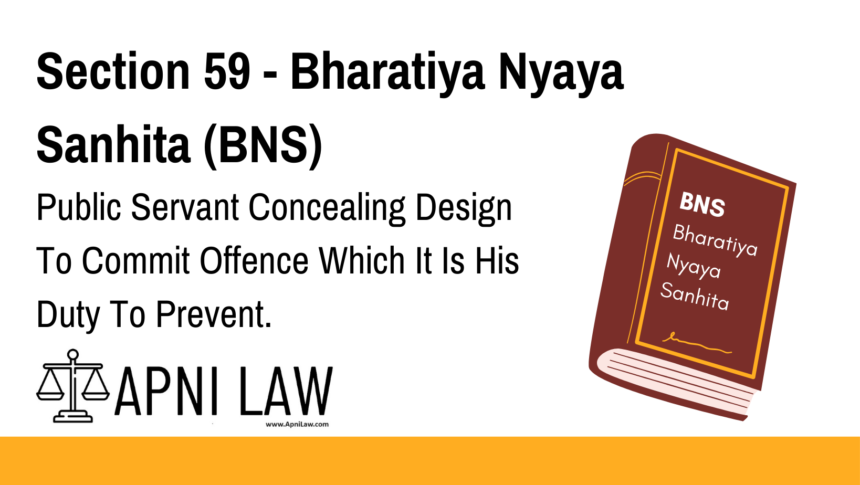Code: Section 59 BNS
Whoever, being a public servant, intending to facilitate or knowing it to be likely
that he will thereby facilitate the commission of an offence which it is his duty as such public
servant to prevent, voluntarily conceals, by any act or omission or by the use of encryption
or any other information hiding tool, the existence of a design to commit such offence, or
makes any representation which he knows to be false respecting such design shall,––
(a) if the offence be committed, be punished with imprisonment of any description
provided for the offence, for a term which may extend to one-half of the longest term of
such imprisonment, or with such fine as is provided for that offence, or with both; or
(b) if the offence be punishable with death or imprisonment for life, with
imprisonment of either description for a term which may extend to ten years; or
(c) if the offence be not committed, shall be punished with imprisonment of any
description provided for the offence for a term which may extend to one-fourth part of
the longest term of such imprisonment or with such fine as is provided for the offence,
or with both.
Illustration.
A, an officer of police, being legally bound to give information of all designs to commit
robbery which may come to his knowledge, and knowing that B designs to commit robbery,
omits to give such information, with intent to so facilitate the commission of that offence.
Here A has by an illegal omission concealed the existence of B’s design, and is liable to
punishment according to the provision of this section.
Explanation of Section 59 BNS
Section 59 of the Bharatiya Nyaya Sanhita, 2023 (BNS) applies exclusively to public servants who fail in their duty to prevent crimes. It holds public officials accountable for deliberately concealing information about offences they are bound to prevent.
Key Elements of Section 59 BNS
- Applies Only to Public Servants
- The accused must be a public servant (e.g., police officer, magistrate, intelligence officer) who has a duty to prevent crimes.
- Intentional Concealment or False Representation
- The public servant must have knowingly concealed or misrepresented a planned offence.
- Use of Encryption or Other Hiding Tools
- If encryption, digital obfuscation, or any other means of concealing information are used, it still falls under this provision.
- Severity of Punishment Based on Crime Outcome
- If the offence is committed, imprisonment up to half of the maximum punishment for that crime.
- If the offence is punishable by death or life imprisonment, the concealment itself can lead to up to 10 years in prison.
- If the offence is not committed, imprisonment up to one-fourth of the maximum punishment for that crime.
Illustrations
Example 1: A Police Officer Fails to Report a Murder Plot
A police officer learns that a gang is planning an assassination but chooses not to act. The murder happens as planned. The officer is punishable under Section 59 BNS, with a sentence up to half of the punishment prescribed for murder.
Example 2: Intelligence Officer Hiding Terrorist Plans
An intelligence officer receives information about a terror attack but intentionally suppresses it. If the attack occurs, the officer can be sentenced to 10 years if the crime was punishable by death or life imprisonment.
Example 3: Concealing a Crime That Was Not Committed
A border security officer knows of an illegal arms smuggling plan but chooses not to report it. If the smuggling does not occur, the officer can still be punished with imprisonment of up to one-fourth of the maximum term for smuggling under BNS.
Common Questions and Answers on Section 59 BNS
1. Who falls under the category of “public servant” in this section?
Public servants include police officers, magistrates, intelligence personnel, customs officials, and others legally bound to prevent crimes.
2. What if a public servant unintentionally fails to report a crime?
Section 59 applies only when the public servant knowingly conceals or deliberately provides false information. Unintentional failure is not punishable under this section.
3. Does digital concealment count as an offence?
Yes. If a public servant uses encryption, deletes records, or manipulates digital evidence to conceal a crime, they are liable under Section 59 BNS.
4. What if the crime does not actually happen?
Even if the planned crime does not occur, the public servant can still be punished with imprisonment up to one-fourth of the longest term for that offence.
5. Can a public servant be fined instead of imprisonment?
Yes. Section 59 BNS provides for both imprisonment and fine, depending on the severity of the concealed crime.
Conclusion
Section 59 BNS enforces strict accountability for public servants who fail in their duty to prevent crimes. It ensures that no official misuses their position to enable criminal activities. Whether the crime is committed or not, the failure to report can result in severe punishment.
For more expert legal insights, visit ApniLaw! 🚀








